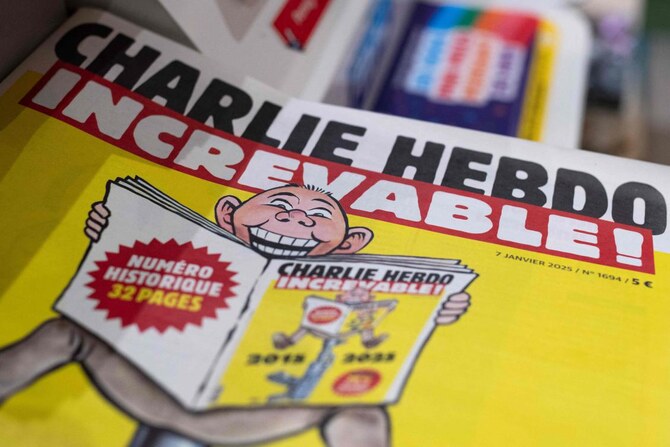BERLIN/PARIS:PARIS: A decade after gunmen stormed the offices of the satirical newspaper Charlie Hebdo in a deadly assault that shook France to its core and ignited a global outcry in defense of freedom of speech, the nation paused on Tuesday to honor the victims and renew its resolve to fight for liberty and democracy.
President Emmanuel Macron and Paris Mayor Anne Hidalgo led solemn tributes at the site of the attack, where 12 people, including some of France’s most beloved cartoonists, were killed on January 7, 2015. Among those remembered was Ahmed Merabet, a police officer who was gunned down on the street while defending the newspaper.
In a poignant ceremony, Macron stood with his wife, Brigitte, alongside former President François Hollande, who had steered France through the aftermath of the attacks. Macron joined police officers in laying wreaths of flowers against the wall of the former Charlie Hebdo headquarters in the 11th district and the gathering observed a minute of silence. A lone trumpet played, resonating through a neighborhood scarred by that day’s bloodshed and later by the Bataclan massacre in November of the same year.
The attacks plunged France into a year of unparalleled terror, beginning with the Charlie Hebdo assault and culminating in the coordinated November attacks, including the Bataclan tragedy. The nation was left grieving, yet public gatherings became acts of resilience, defying fear and standing firm against violence.
The massacre at Charlie Hebdo, carried out by two brothers claiming allegiance to Al-Qaeda, signaled the dawn of a dark new chapter for France. A wave of extremist violence forced the country to reexamine its security measures. In the days following the attack, then German Chancellor Angela Merkel marched arm in arm with Hollande and other world leaders through the streets of Paris — a powerful display of unity in defense of freedom of expression that reverberated far beyond French borders.
Interior Minister Bruno Retailleau, speaking on RTL Tuesday, acknowledged how far France has come. while warning of the persistent dangers. “France has rearmed considerably, but the threat is still there,” he said, pointing to both external dangers and the rise of homegrown radicalization.
“The nature of the threat has changed,” Retailleau added. “It is now primarily endogenous — young individuals radicalized through social media. Last year alone, our services foiled nine attacks, the highest number since 2017.”
The attacks’ impact continued to extend beyond France itself. German Chancellor Olaf Scholz shared a message of solidarity on social media, writing, “#JeSuisCharlie spread around the world after the barbaric attack on Charlie Hebdo 10 years ago. Today, as then, we share the grief of our French friends. The attack targeted our shared values of freedom and democracy— we will never accept this.”
The attack on Charlie Hebdo, carried out in retaliation for the newspaper’s irreverent caricatures of the Prophet Muhammad, ignited fierce global debates about the limits of free expression. In the days that followed, millions marched in solidarity, brandishing pens and signs declaring, Je Suis Charlie (I am Charlie).
But 10 years on, the unity of that moment has given way to deeper divisions. Charlie Hebdo said its research shows that while a majority of French still believe in the fundamental right to caricature, younger generations increasingly criticize satire they see as divisive or insensitive, particularly toward marginalized communities.
“Are we all still Charlie?” one television special asked. For some, the answer is a resounding yes — a tribute to those who paid the ultimate price for freedom of expression. For others, French media say, it’s a more complicated question.
The newspaper remains unapologetic. Its 10th-anniversary edition features a cover cartoon of a reader perched on an AK-47, captioned “Indestructible.” In an editorial, the magazine’s director, Laurent Sourisseau, known as “Riss,” defended the power of satire. “If you want to laugh, it means you want to live,” he wrote.
Germany “shares the pain of our French friends,” Chancellor Olaf Scholz said Tuesday on the 10th anniversary of a deadly attack on French satirical newspaper Charlie Hebdo that claimed 12 lives.
The “barbaric attack... targeted our common values of liberty and democracy — which we will never accept,” Scholz said in a post in French on X.




















